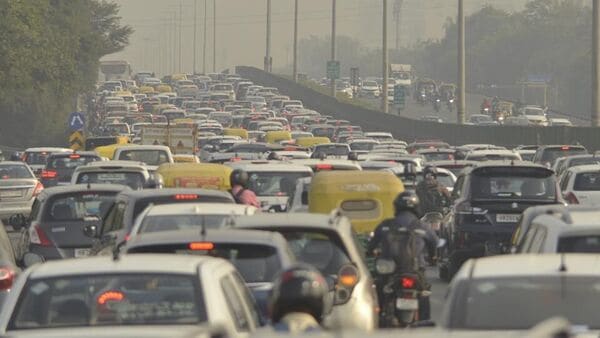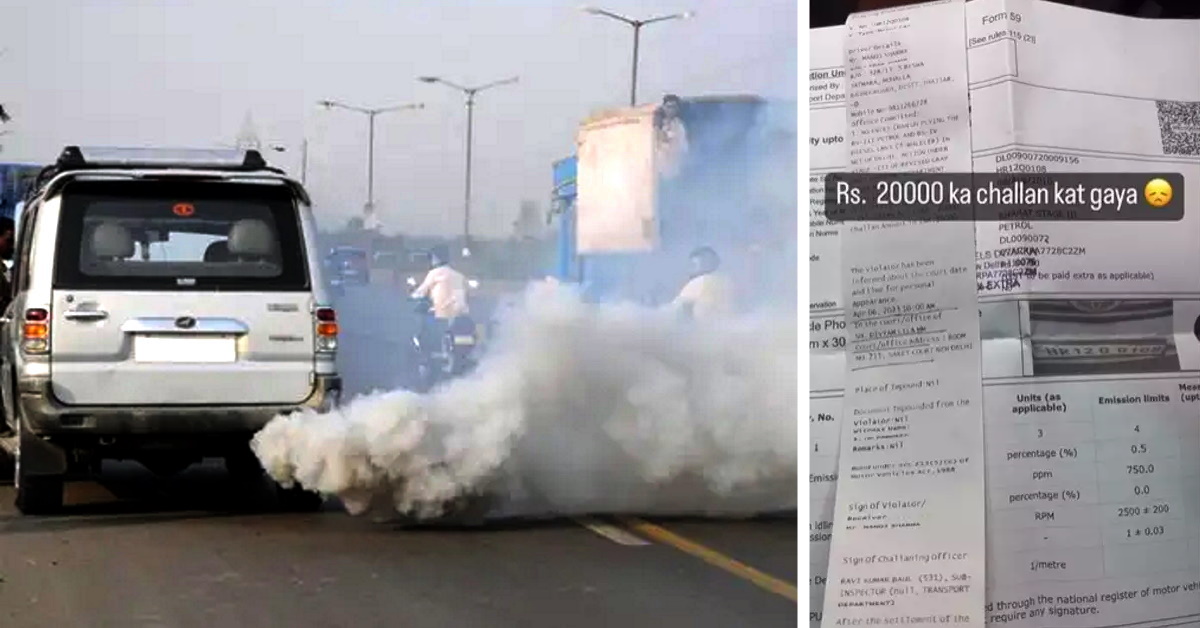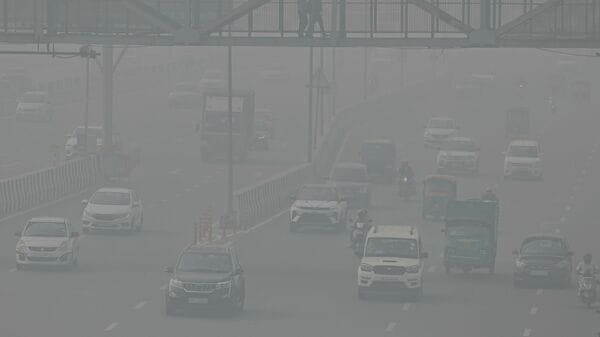Introduction:
Delhi, India’s capital city, is currently grappling with a severe air pollution crisis, with its air quality index (AQI) soaring well beyond the hazardous threshold, crossing the 450 mark. In response to this escalating issue, the Commission for Air Quality Management (CAQM) has initiated Stage 4 of the Graded Response Action Plan (GRAP). This stage introduces significant restrictions and bans, with a particular focus on vehicles that do not comply with current emissions standards.
Immediate Ban on BS3 Petrol and BS4 Diesel Vehicles:

As part of Stage 4 of CAQM’s GRAP, the Delhi Transport Department has enforced a sweeping ban on the entry of all Bharat Stage 3 (BS3) petrol and Bharat Stage 4 (BS4) diesel vehicles within the National Capital Territory of Delhi. The ban encompasses all light motor vehicles (LMVs), commonly known as four-wheelers, that fall short of the current emissions standards.
Exception for Emergency Service and Government Vehicles:
It’s important to note that this ban does not apply to vehicles used for essential services, emergency vehicles, and government-owned vehicles that fall under the restricted emissions standards.
Strict Penalties for Violations:
To ensure compliance with this vital measure, the Delhi Transport Department has issued a stern warning: any BS3 petrol or BS4 diesel LMVs found operating within the city during this ban will be subject to prosecution under Section 194(1) of the Motor Vehicle Act, 1988. The penalty for such violations is a substantial fine of Rs 20,000.

Background on the Pollution Crisis:
The declining air quality in Delhi can be primarily attributed to the burning of crop residues in the neighboring states of Punjab and Haryana. While this is a significant contributor, vehicular emissions also play a substantial role in the worsening of air quality.
Additional Measures:

In addition to the ban on older vehicles, Stage 4 of CAQM’s GRAP imposes several other restrictions. These include:
– A ban on the entry of most trucks in Delhi-NCR, except for those transporting essential goods, vehicles running on Compressed Natural Gas (CNG), or electric vehicles.
– A temporary ban on non-BS6-compliant diesel four-wheelers in the National Capital Region.
– Suspension of all construction and demolition activities related to public projects.
These additional measures have been introduced to address various sources of pollution in the region comprehensively.
Impact on Vehicle Sales:
These measures are being implemented when the Indian automobile industry is witnessing robust sales, particularly in the utility vehicle (UV) segment, which includes SUVs and MPVs. The ban on older vehicles and the strong demand for SUVs reflect the shifting landscape of the Indian automotive market.
The Necessity of the Ban:

The ban on BS3 petrol and BS4 diesel vehicles is a significant step in reducing vehicular emissions, a key contributor to the city’s worsening air quality. This action is deemed necessary to protect the health and well-being of the city’s residents and to address the environmental concerns associated with air pollution.
Challenges and Controversies:
While the ban is seen as a critical step in addressing Delhi’s pollution crisis, it is not without its challenges and controversies. Some of the issues and concerns raised include:
1. Impact on Vehicle Owners: Owners of BS3 petrol and BS4 diesel vehicles may face significant financial losses as their vehicles become unusable in the city. They may also be burdened with the cost of upgrading to compliant vehicles.
2. Economic Implications: The ban could have economic implications, affecting businesses that rely on vehicles to transport goods and people. The restriction on trucks, in particular, may disrupt the supply chain and lead to increased transportation costs.
3. Access to Essential Services: While emergency services and government vehicles are exempt from the ban, there may be concerns about how these services will be impacted during the ban’s enforcement.
4. Compliance and Enforcement: Ensuring strict compliance and effective enforcement of the ban is a challenge. Monitoring the vast number of vehicles in the city and detecting violators is a logistical challenge.
5. Long-term Solutions: While the ban addresses immediate concerns, long-term solutions to combat air pollution, such as encouraging electric vehicles and improving public transportation, are essential for sustainable change.
Public Health and Environmental Benefits:
Despite the challenges and controversies, the ban on BS3 petrol and BS4 diesel vehicles is expected to yield significant public health and environmental benefits. Some of the advantages include:
1. Improved Air Quality: The reduction of older, more polluting vehicles from Delhi’s roads is expected to lead to a noticeable improvement in air quality, which will have a positive impact on the health of the city’s residents.
2. Reduced Respiratory Issues: Cleaner air can lead to a decrease in respiratory illnesses and related health care costs, as pollution has been linked to a range of health problems, including asthma and lung diseases.
3. Environmental Conservation: Lower vehicle emissions will contribute to environmental conservation and help protect Delhi’s ecosystems, including its flora and fauna.
4. Encouraging Clean Technologies: The ban serves as an incentive for vehicle manufacturers to invest in and promote cleaner and more sustainable technologies, such as electric and CNG-powered vehicles.
Conclusion:
In conclusion, the ban on BS3 petrol and BS4 diesel vehicles in Delhi is a crucial step in addressing the city’s severe air pollution crisis. While it faces challenges and controversies, it is seen as necessary to safeguard public health and the environment. The measures introduced under Stage 4 of CAQM’s GRAP, including the ban on older vehicles and the restrictions on truck entry, aim to tackle the sources of pollution in the region comprehensively. The immediate benefits of improved air quality and long-term incentives for cleaner technologies make this ban an important part of Delhi’s efforts to combat air pollution and promote a sustainable future.
Frequently Asked Questions (FAQs)
FAQ 1:
Q: What is the reason for the ban on BS3 petrol and BS4 diesel vehicles in Delhi?
A: The ban is a response to the severe air pollution crisis in Delhi, with the city’s air quality index (AQI) surpassing hazardous levels.
FAQ 2:
Q: Are all BS3 petrol and BS4 diesel vehicles banned in Delhi?
A: Yes, the ban applies to all BS3 petrol and BS4 diesel vehicles, except for those used for emergency services and government-owned vehicles.
FAQ 3:
Q: What penalties will vehicle owners face if they violate the ban?
A: Violators will be subject to a fine of Rs 20,000 under Section 194(1) of the Motor Vehicle Act, 1988.
FAQ 4:
Q: Are there any additional measures in place to address pollution in Delhi?
A: Yes, Stage 4 of the Graded Response Action Plan (GRAP) also includes a ban on most trucks, restrictions on non-BS6 diesel four-wheelers, and suspension of construction activities for public projects.
FAQ 5:
Q: How will this ban impact vehicle sales in India?
A: The ban comes at a time when the Indian automotive industry is experiencing robust sales, particularly in the utility vehicle (UV) segment.
FAQ 6:
Q: What are the key concerns and challenges associated with the ban?
A: Challenges include the financial impact on vehicle owners, potential economic implications, and ensuring effective enforcement and compliance.
FAQ 7:
Q: What are the public health and environmental benefits of the ban?
A: The ban is expected to lead to improved air quality, reduced respiratory issues, environmental conservation, and an incentive for cleaner vehicle technologies.
FAQ 8:
Q: How can vehicle owners cope with the ban?
A: Vehicle owners may need to upgrade to compliant vehicles or explore alternative modes of transportation during the ban.
FAQ 9:
Q: What steps are being taken to encourage cleaner and more sustainable transportation in Delhi?
A: The ban serves as an incentive for vehicle manufacturers to invest in and promote cleaner technologies, such as electric and CNG-powered vehicles.
FAQ 10:
Q: Is this ban expected to have a long-term impact on Delhi’s air quality?
A: While it addresses immediate concerns, long-term solutions, including promoting electric vehicles and improving public transportation, are crucial for sustained improvement in air quality.